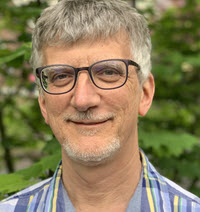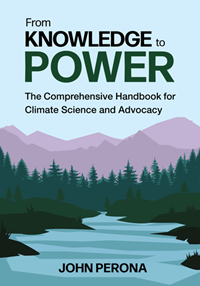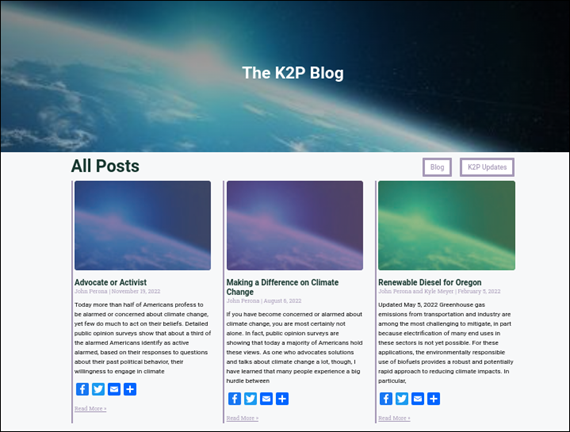From Knowledge to Power - an interview with John Perona: scientist, author, and blogger
Posted on 1 September 2023 by BaerbelW
A short while ago John Perona got in touch to make us aware of his weekly newsletter „Earthward“ and his website „From Knowledge to Power“. We found it to be another resource with some mission similarities to Skeptical Science but with a strong identity of its own, and powerful content with a more policy-centric approach. As we were excited to learn about John’s website, we collaborated with him for this interview-style blog post to learn more about his background and how his site came to be.
Could you please tell us a bit about your science background?
 I’m an academic research scientist by profession, originally trained as a quantitative biochemist specializing in enzyme structure-function relationships and especially the interactions of protein enzymes with DNA and RNA. However, I also had the good fortune to spend childhood summers in the Italian Alps with my extended family, and this is probably what catalyzed my lifelong passion for the outdoors that is now expressed in my climate work.
I’m an academic research scientist by profession, originally trained as a quantitative biochemist specializing in enzyme structure-function relationships and especially the interactions of protein enzymes with DNA and RNA. However, I also had the good fortune to spend childhood summers in the Italian Alps with my extended family, and this is probably what catalyzed my lifelong passion for the outdoors that is now expressed in my climate work.
It took me a long time, but after I earned tenure I started shifting my emphasis toward environmental problems. On the research side, my students and I began studying some unusual enzymes from methanogens, the microorganisms that generate all the biologically derived methane on Earth. After moving from California to Portland, Oregon, we learned how to culture methanogens in our lab and eventually discovered a metabolic pathway that allows these cells to assimilate reduced forms of sulfur in anaerobic environments lacking oxygen.
Are you involved with volunteer organizations active in the climate space?
Outside the lab, I got very interested in the efforts of a small nonprofit law firm, the Environmental Defense Center, to hold the oil industry to account for damages caused by offshore oil and gas drilling in the Santa Barbara channel. Later, in Portland, my interests in this and other environmental issues led me into the formal study of environmental law and eventually also to work as a citizen advocate for a healthy climate. I volunteered for many years with the Citizens’ Climate Lobby (CCL), advocating for an economy-wide carbon tax, and more recently have engaged with other advocates in Oregon to help influence the state legislature to pass laws promoting renewable energy.
What is the main focus of your book “From Knowledge to Power”?
 From Knowledge to Power (K2P), was published in November 2021 and is a comprehensive handbook covering climate science, policy, politics and citizen advocacy in the US. It’s written for laypersons who want to get involved in healthy climate advocacy and is also suitable as a text for adult education and university audiences. The book is much more detailed than other works on climate science for a general audience - but I became convinced, through my advocacy, that there is demand for a more rigorous treatment that helps advocates build a secure knowledge base, which they can use to be more effective in their work to influence government and business leaders.
From Knowledge to Power (K2P), was published in November 2021 and is a comprehensive handbook covering climate science, policy, politics and citizen advocacy in the US. It’s written for laypersons who want to get involved in healthy climate advocacy and is also suitable as a text for adult education and university audiences. The book is much more detailed than other works on climate science for a general audience - but I became convinced, through my advocacy, that there is demand for a more rigorous treatment that helps advocates build a secure knowledge base, which they can use to be more effective in their work to influence government and business leaders.
K2P starts with a heavy emphasis on climate science and covers all the key issues on the energy balance, carbon cycle, models and projections, and impacts. Readers of Skeptical Science will be familiar with the main denialist arguments, and these are integrated (together with rebuttals) into the early science chapters. The book then moves into a short interlude describing energy transition roadmaps and a chapter on fossil fuels, which includes the politics of disinformation campaigns by fossil fuel companies. The last four chapters are on renewable energy technology and policy, interspersed with opportunities for advocacy. There’s also a dedicated chapter on advocacy with a nonpartisan focus, explaining how progressives and conservatives alike can find a home in the advocacy movement.
Where can readers find more information related to the book?
I built the website, "From Knowledge to Power", to support the K2P project, and it now also serves as the online home of the Earthward newsletter. The site is organized into pages covering each of the three main topics of the book - science, solutions and advocacy - where one can find book excerpts, reliable science and policy web resources, and suggestions on advocacy groups that interested readers might want to connect to at the Oregon state and national levels. There’s a Climate/Talk page where I offer some detailed powerpoint presentations on topics like hydrogen and carbon capture, a Curriculum Guide to support use of the book in classrooms, and a Bookshelf containing thumbnail reviews of other climate and renewable energy books that I recommend. The Blog page contains writings I mostly posted after the book was published, including a description of the K2P project, a summary of some early Biden administration initiatives, and a post that distinguishes the terms "advocate" and "activist" in a way that I hope will help spur political inclusiveness in the climate advocacy movement.
How did you decide to create your website? What led you to think it necessary?
My major goal in writing K2P was to provide a resource for the healthy climate movement, and it is really designed for citizens who want to go beyond making changes in their personal lives. Since the climate space is always changing with new political and technological developments, it seemed clearly necessary to offer a venue where updates would be possible. Also, as my ambition with K2P was to be comprehensive, the amount of specific detail I could provide on particular topics was necessarily limited. The Earthward newsletter is a remedy for this, since it gives me a chance to provide up-to-date deep dives into specific issues.
How do you decide what to write about, for the website?
I look for items in my daily newsfeed that are of national or global significance to climate change and renewable energy, where I can offer some explanation and context to put the issue in relief. I have focused a fair amount on the policy and politics of renewable energy technology so far, so there will probably be more posts on new scientific findings going forward. I definitely think about how the issue resonates in the healthy climate advocacy movement at state or national levels, since I would love to see the newsletter become a source of both information and inspiration for advocates. Certainly Earthward takes a science-forward approach, and also one that is as non-confrontational and inclusive of as much of the political spectrum as possible. In this regard my inspiration comes from CCL and The Nature Conservancy, and I am honored that K2P was endorsed by leaders of both these organizations.
How much time and effort does the website take, and is it hard to fit into the rest of your obviously busy and productive life?
It’s true that teaching, research and administrative work absorb most of my efforts during the academic year, which is why I am so grateful to have summers as a time when I can concentrate on other projects, like the K2P website. I worked with a website development company to initially design and build the site in the summer of 2021, before the book came out. In summer of 2022 I put a lot of effort into writing the Curriculum Guide, which is available on the site and offers a chapter by chapter guide to unpacking the content of the book. I and others at Portland State have used the book in our classes on climate change, and my hope is that the Guide makes K2P a better resource for college and adult education students. This summer was dedicated to the Earthward newsletter. I am committed to writing it every week, which might sometimes be a crunch after Fall teaching starts, but will be worth it as it really helps sharpen my thinking in aid of research, advocacy work and teaching.
Do you get assistance from others?
On the technical side, managing and updating the website is the work of W. Hayden Farris, a talented recent graduate of Portland State University. In terms of inspiration, I am certain that the whole K2P project would not have come about were it not for the support and encouragement I got from other citizen advocates. In 2017, I was with a group of active Portland area CCL advocates brainstorming ideas for how to get the local community on board for a national carbon tax, and we thought that offering a monthly climate education seminar series would be a good way to get folks engaged. With their support, I led that series for eight months, covering many key science and policy concepts, and inviting guest speakers to talk about some local initiatives. In addition to getting much better connected in the community, I discovered that many layperson advocates were eager for deep dives into climate science, which definitely influenced the style of the book. I also got my own education into the importance of the social and equity dimensions of climate change. I had been thinking about global warming primarily as a biophysical problem, and this experience broadened my outlook and profoundly affected the organization of the book. That influence continues in the Earthward newsletter.
Is there a means to get regular updates?
I started writing the weekly Earthward newsletter a few months ago as a way of continuing the climate education work that I began with K2P. There are eight editions of the newsletter so far which are archived on the website. New issues will appear on Thursdays and you can subscribe to get them by email. A recent newsletter was on the youth victory in the Montana climate case. Other issues in the summer news have included offshore wind, the policy challenge of excluding natural gas in new buildings, the growing respectability of solar geoengineering, and the resilience of the electricity grid to extreme weather.
One newsletter that might be of particular interest to Skeptical Science readers is on climate doomism, where I suggested some implications of a recent paper in Nature on the human belief in moral decline. That belief is pervasive yet pretty clearly unfounded, and the authors linked the illusion to some well-established psychological mechanisms. Those same mechanisms, when operating on a phenomenon like global warming that is actually happening, could lead susceptible people to exaggerate the decline and thus incorporate doomism into their worldviews.































 Arguments
Arguments
































Comments